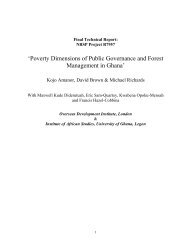The Gambian Tourist Value Chain and Prospects for Pro-Poor Tourism
The Gambian Tourist Value Chain and Prospects for Pro-Poor Tourism
The Gambian Tourist Value Chain and Prospects for Pro-Poor Tourism
Create successful ePaper yourself
Turn your PDF publications into a flip-book with our unique Google optimized e-Paper software.
<strong>Tourism</strong> in <strong>The</strong> Gambia: International ‘Best Practice’ in Poverty Reduction & <strong>Pro</strong>-<strong>Poor</strong> Growth Through <strong>Tourism</strong><br />
Draft Report (Friday 22 nd December 2006)<br />
If all <strong>Gambian</strong> households supplying agricultural produce to hotels <strong>and</strong> restaurants had a<br />
marketable output similar to the level found during the survey <strong>and</strong> there was a 70% mark-up<br />
between farm gate <strong>and</strong> hotel kitchen prices this would imply supplying the £1.7m sales of<br />
locally-sourced food to hotels <strong>and</strong> restaurants (see Annex F) generates farm-gate sales of<br />
about £1.0m. Farm gate sales of £1.0m could, in turn, impact directly upon about 2 600<br />
households if the suppliers to the tourism agricultural supply chain shared similar<br />
characteristics to the producers surveyed during the survey of GiG beneficiaries.<br />
Clearly this analysis is rudimentary. Whilst the scale of the locally-sourced food market<br />
looks plausible – <strong>and</strong> is supported from several different sources – the possible number of<br />
beneficiaries of this local procurement is based upon much more shaky assumptions. <strong>The</strong>re<br />
is no reason why, <strong>for</strong> instance, people supplying fish to the tourism sector have a similar<br />
sales per household compared with a small survey of horticultural producers.<br />
Notwithst<strong>and</strong>ing this, the analysis suggests that one of the biggest pro-poor impact from<br />
tourism on the poor – in terms of the number of households affected – either is or could be<br />
through agricultural linkages. It is also the case that agricultural supplies travel rather more<br />
extensively than tourists in <strong>The</strong> Gambia. <strong>The</strong>re<strong>for</strong>e the pro-poor impacts of agricultural<br />
supplies reach areas, like the impoverished North Bank District, that derive little other<br />
benefit from tourism.<br />
<strong>The</strong>re is emerging ‘best practice’ experience relating to aspects of market facilitation<br />
exercises in the agricultural supply chain that are described in Annex D - namely by working<br />
on both the supply <strong>and</strong> dem<strong>and</strong> end of the supply chain to facilitate a viable market<br />
interface between poor rural farmers <strong>and</strong> large urban hotels <strong>and</strong> restaurants. <strong>The</strong> pro-poor<br />
impact of sales of agricultural produce to the tourist sector would obviously be enhanced if<br />
the local content of agricultural supplies increased higher than the current 45% to 50%<br />
figure. <strong>The</strong>re have been calls to prevent the tourist sector importing agricultural products<br />
that are available locally. This approach is not recommended because it is a coercive<br />
approach that limits the freedom of hotel <strong>and</strong> restaurant managers to select the best goods<br />
available. It also contradicts <strong>Gambian</strong> commitments to liberalisation <strong>and</strong> diverts attention<br />
from an enabling approach of supporting <strong>Gambian</strong> farmers, through GiG-like interventions,<br />
to supply the tourist sector.<br />
Box 8: <strong>Pro</strong>-<strong>Poor</strong> <strong>Tourism</strong> Regulatory Issue # 7<br />
As probably the most broad-based linkage between the tourist sector <strong>and</strong> the poor in the<br />
destination, there is a strong case <strong>for</strong> scaling up the support currently provided by NGOs<br />
using charitable donations to work with small farmers <strong>and</strong> assist them in accessing hotel<br />
<strong>and</strong> restaurant agricultural supply chains on mutually satisfactory terms.<br />
An important regulatory function <strong>for</strong> government is to regulate the quality of food served to<br />
tourists in the interests of tourist health. <strong>The</strong> legal annex to the Master Plan suggested that<br />
tourists are not currently being adequately protected from unhygienic foodstuffs. This could<br />
have an important developmental impact because unhealthy food could encourage tourists<br />
to eat at the more up-market establishments which, the hotel survey found, tended to have<br />
the highest propensity to import.<br />
Box 9: <strong>Pro</strong>-<strong>Poor</strong> <strong>Tourism</strong> Regulatory Issue # 8<br />
Government needs to protect tourist health by regulating the quality of food preparation <strong>and</strong><br />
storage effectively to minimise the risk of ill-health.<br />
38

















